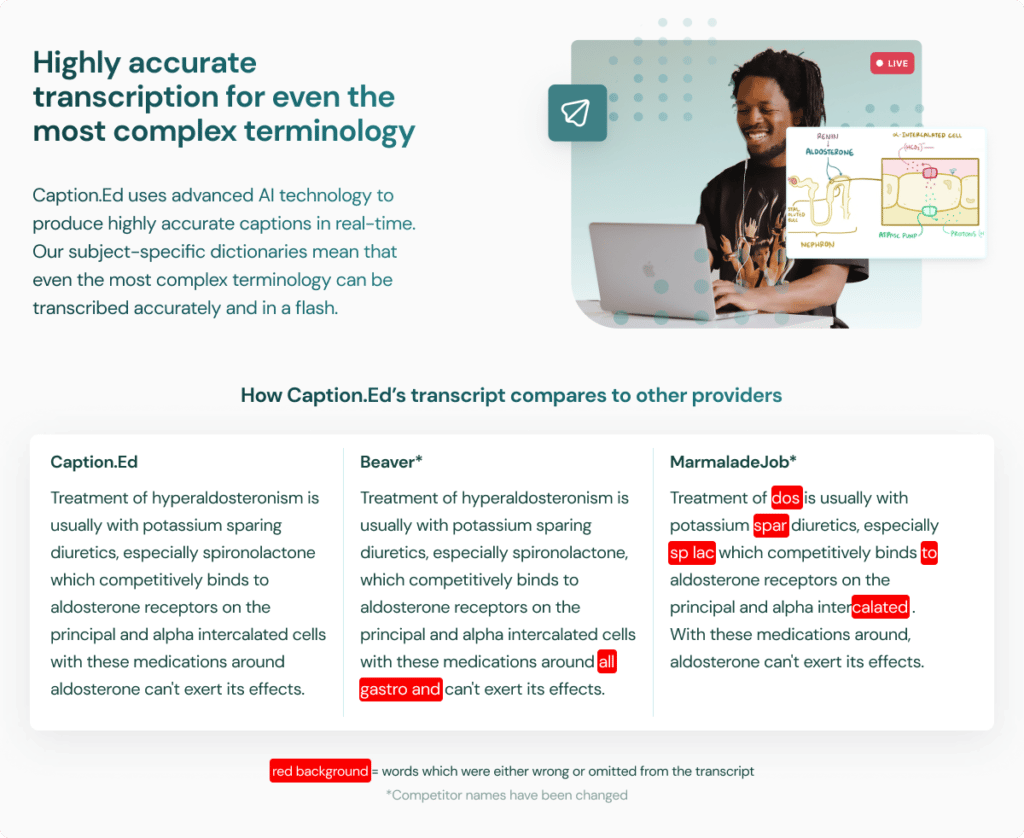For people who are deaf or have hearing and cognitive disabilities, captions can open the doors to greater accessibility because they allow individuals to see what cannot be heard. This means the accuracy of captions is fundamental. Having accurate captions means that people are able to read the correct information and can gain a solid understanding of what’s being said.
Caption.Ed provides highly accurate real-time captions for both live and pre-recorded media but just how accurate is Caption.Ed? And how does the accuracy of Caption.Ed stack up against other captioning software? To find out the answer, our team conducted a series of tests – let’s explore the results below.
Test Results
Based on a test we ran against two pieces of media with complex terminology, Caption.Ed had an average word error rate of 3%, compared to 4% and 12% from other captioning providers.
Below is a diagram illustrating the number of word errors between Caption.Ed and two other providers based on an extract of the transcript from our test media.

Test Methodology
The two pieces of test media were selected based on the following criteria:
- Specialist subject matter: media selected uses a high volume of complex medical terminology
- Accents: media selected includes different accents
- Speed: media selected includes speakers talking at different speeds
The two forms of media used can be viewed here:
A stenographer manually transcribed both forms of media to provide a baseline of 100% accuracy.
Next, we ran the software for Caption.Ed, Beaver* and MarmeladeJob* against the two forms of media, and the generated captions were compared to the 100% baseline.
For each captioning provider, errors were struck through with the correction highlighted in red. Any missing words were also highlighted in red.
For all three captioning providers, the number of errors and missing words were added to calculate the word error rate percentage.
*Captioning provider names have been changed
How Can You Increase The Accuracy Of Your Captions?
Automatically generated captions that are 100% accurate may not always be achievable. This is because the accuracy of captions can vary according to audio quality, topic and speaker.
However, there are some simple steps you can take to improve the accuracy of your captions. We recommend trying these top tips:
- Ensure you have a strong internet connection. Slow broadband can lead to interruptions to your live stream captioning and can affect accuracy.
- Wear a good quality microphone or headset (rather than using the built-in microphone on your device). This can help reduce background noise which can often interfere with captioning software, leading to missing or incorrect words.
- Use high quality audio. Just like a poor internet connection, poor audio quality can negatively affect your captioning experience. You can improve the audio quality by opting for a good quality microphone.
- Caption.Ed has a built-in library to detect complex terminology. If you’re studying medicine, law, or a course with a high level of scientific content, remember to set the language to Social Sciences and Law or Health and Life Sciences before you hit ‘start session’. We also recently launched Custom Vocabulary which allows admins to add bespoke terminology into the Caption.Ed library to allow for even higher accuracy!


